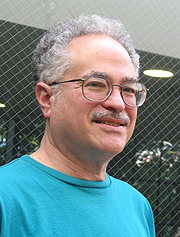|
March 8, 2004
American studies professor to discuss ‘cash
value’ of white privilege in diversity lecture series
By Scott Rappaport
What is whiteness worth?
American studies professor George Lipsitz will address that question
at a presentation on Thursday, March 11, from noon to 1:30 p.m. at the
Bay Tree Building, Conference Room D. The event is part of the 2004
Diversity Lectures series sponsored by the Office of Equal Employment
Opportunity/Affirmative Action.
|

The author of several prominent works in the field of American
studies, George Lipsitz recently joined the UCSC faculty, coming
from UC San Diego. Photo: Scott Rappaport
|
“It’s worth a lot,” Lipsitz noted during a recent interview
at his Oakes office.
“My basic argument is that whiteness is a socially constructed
advantage in society—not just an incidental identity. It’s
about assets as well as attitudes, property as well as pigment, opportunities
as well as intentions—and the white race has no valid reason for
this advantage.”
“There is an overwhelming consensus among biologists and anthropologists
that there is as much variation within races as between them,”
Lipsitz explained. “For social reasons, we pick on skin color,
but you could just as easily say that blue-eyed people are a race. It’s
a scientific fiction that’s become a social fact. And it's not
true that you know something about someone just by knowing their race.
For example, the sickle cell trait, which is more pronounced among blacks,
has also been found to be widespread among white southerners.”
Lipsitz argues that because of the social way it has been treated,
race is the single most important variable in determining opportunities
and life chances in the United States. He noted that there is a strong
likelihood that race will determine what assets you own, the quality
of education you receive, your exposure to environmental toxins, and
your treatment by the criminal justice system.
“Inherited wealth is a huge way in which whiteness perpetuates
itself because assets are passed down through generations and are key
elements in starting a business, buying a home, and getting an education,”
Lipsitz said. “We are closing the income gap between blacks and
whites, but the wealth gap is getting bigger in terms of things like
housing, capital gains, stock ownership, and education. This shows how
past discrimination plays a significant role in present and ongoing
discrepancies in wealth.”
“My contention is that you can put a dollar value on it,”
he added. “The current adult generation of African Americans ages
25 to 50 has lost $90 billion in wealth compared to whites.”
Lipsitz pointed out that the many unfair obstacles faced by communities
of color transfer into gains for whites. He added that even the poorest
of poor whites are less likely to be in schools with concentrated poverty
or face environmental risks than African Americans, noting that a poor
black person has three times the likelihood of acquiring lead poisoning
than a white one.
“Almost no blue-collar whites fall to the bottom of the economic
ladder, but many middle class or even wealthy blacks do,” he added.
“It’s because of such things as discrimination in the criminal
justice system--blacks often get maximum sentences while poor whites
are less likely to get the full sentence.”
But Lipsitz stressed that many groups across the country are working
hard on a social agenda to bring about change. He said this includes
advocating for the enforcement of existing housing, employment, and
environmental laws--as well as focusing on asset building in the black
community through financial counseling, pooling capital, and making
sure that affordable housing is attached to new development projects.
Other positive actions include encouraging legislative efforts against
common practices such as predatory mortgage lending, and promoting efforts
to link schools with housing in ways that would work to desegregate
neighborhoods without the use of court orders.
“People tend to think that discrimination is an individual matter--as in name-calling--and not a systemic problem,” Lipsitz observed.
“We hear a lot of appeals for unity and to transcend differences,
but if we are going to be united, we have to take an honest look at
the things that divide us.”
Lipsitz recently joined the UCSC faculty, coming from UC San Diego
where he served as director of the Thurgood Marshall Institute. He is
the author of several prominent works in the field of American studies,
including American Studies in a Moment of Danger and The Possessive
Investment in Whiteness.
The UCSC Diversity Lecture Series is open to all faculty and staff,
but an RSVP by telephone at (831) 459-5087 or via e-mail
is required.
Return to Front Page
|